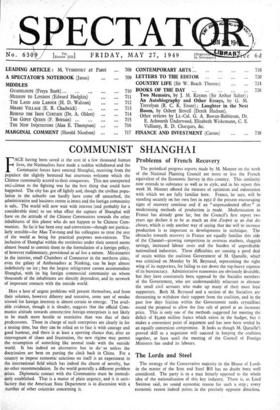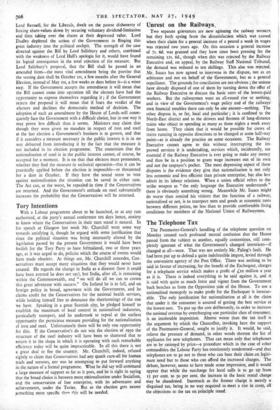The Lords and Steel
The strategy of the Conservative majority in the House of Lords in the matter of the Iron and Steel Bill has no doubt been well considered. The party is to a man bitterly opposed to the whole idea of the nationalisation Of this key industry. There is, as Lord Swinton said, no sound economic reason for such a step ; every economic reason indeed points in the precisely opposite direction. Lord Rennell, for the Liberals, dwelt on the patent dishonesty of forcing share-values down by securing voluntary dividend-limitation and then taking over the shares at their depressed value. Lord Dudley deplored the action of the Government in flinging this peat industry into the political cockpit. The strength of the case directed against the Bill by Lord Salisbury and others, combined with the weakness of Lord Hall's apologia for it, would have found its logical consequence in the total rejection of the measure. But Lord Salisbury's proposal, that the Bill shall be passed in an amended form—the most vital amendment being the proviso that the vesting date shall be October 1st, a few months after the General Election, instead of May 1st, a few weeks or days before it—is a wiser step. If the Government accepts the amendment it will mean that the Bill cannot come into operation till the electors have had the opportunity to express themselves regarding it ; if the Government rejects the proposal it will mean that if fears the verdict of the electors and declines the democratic method of decision. The adoption of such an amendment by the House of Lords. will conse- quently face the Government with a difficult choice, but in one way it may prove less difficult than it seems. Ministers may claim that though they were given no mandate in respect of iron and steel at the last election a Government's business is to govern, and that if it considers a measure necessary in the public interest it is in no way debarred from introducing it by the fact that the measure is not included in its election programme. The contention that the nationalisation of steel is in the public interest cannot, of course, be accepted for a moment. It is on that that electors must pronounce, whether they find the measure in technical operation—that it can be practically applied before the election is impossible—or threatened for a date in October. If they have the sound sense to vote against nationalisation the situation can be saved in either case. The Act can, at the worst, be repealed in time if the Conservatives are returned. And the Government's attitude on steel substantially increases the probability that the Conservatives will be returned.







































 Previous page
Previous page